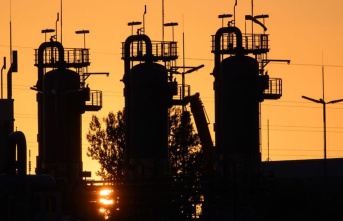The fear of gas bottlenecks weighed heavily on the Dax on Monday. Germany gets practically no more natural gas from Russia. The Russian state-owned company Gazprom is suspending all deliveries through the Nord Stream 1 pipeline until further notice - allegedly due to technical problems. Sectors that are strongly dependent on the economy, such as the chemical and automotive sectors, recorded significant losses throughout Europe and also in Germany.
The German leading index Dax lost 2.35 percent to 12,743.23 points. The MDax of medium-sized stocks fell on Monday by 2.19 percent to 24,610.92 points. The Eurozone leading index EuroStoxx 50 lost 2 percent.
The high gas prices and the increasing delivery restrictions weighed primarily on the shares of the largest German gas importer Uniper, which recently dropped by almost eleven percent as the bottom of the MDax. According to experts, the group will soon need further state aid. Chemical stocks also came under particular pressure. The industry needs a lot of gas for production.
Another topic of conversation was that the traffic light coalition of Chancellor Olaf Scholz (SPD) wants to relieve citizens in view of rising prices with a third support package of more than 65 billion euros. One planned measure is that a reduced price should apply for a certain basic consumption of electricity. RWE shares lost 2.8 percent, Eon's shares recently fell by 0.6 percent.
The prospect of excessive profits being skimmed hit renewable energy companies in particular. The shares in the solar and wind park operator Encavis collapsed by around eight percent and those of PNE by more than five percent.
In the market environment, which was severely impacted by the gas crisis, shares in the online industry also suffered significantly. Above all, this applied to Hellofresh, which fell to its lowest level since March 2020 and recently dropped by more than four percent.








